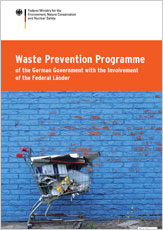



Waste is both the product and a reflection of our wealthy society. Virtually everything that surrounds us and interests us, be it furnishings, vehicles, consumer goods or food, becomes waste at the end of its useful life. For this reason, today’s production and consumption society is often (with good reason) referred to as the "throw-away society", because waste expresses the negative side of production. Vast quantities of raw materials and energy resources are extracted from nature, processed and manufactured, then sold as consumer goods to satisfy our needs. After use, they eventually end up as waste. Every product carries collateral ecological damage associated with its production, its use, and ultimately, its disposal; there are also matters of ethics, as well as global and inter-generational justice, to consider.
The Waste Prevention Programme, in conjunction and coordination with the German Government’s other existing strategies, will help to ensure the coherent, sustainable handling of natural resources and raw materials in Germany. In 2002, the German Government made a commitment to sustainability with the National Strategy for Sustainable Development, as the guiding principle behind its policy-making. As part of this Strategy, it resolved to double raw material productivity by 2020 compared with the base year 1994.
Good environmental and consumer protection policies are achieved when they are a joint endeavour. Get in touch with us, or get involved through one of our options for dialogue.